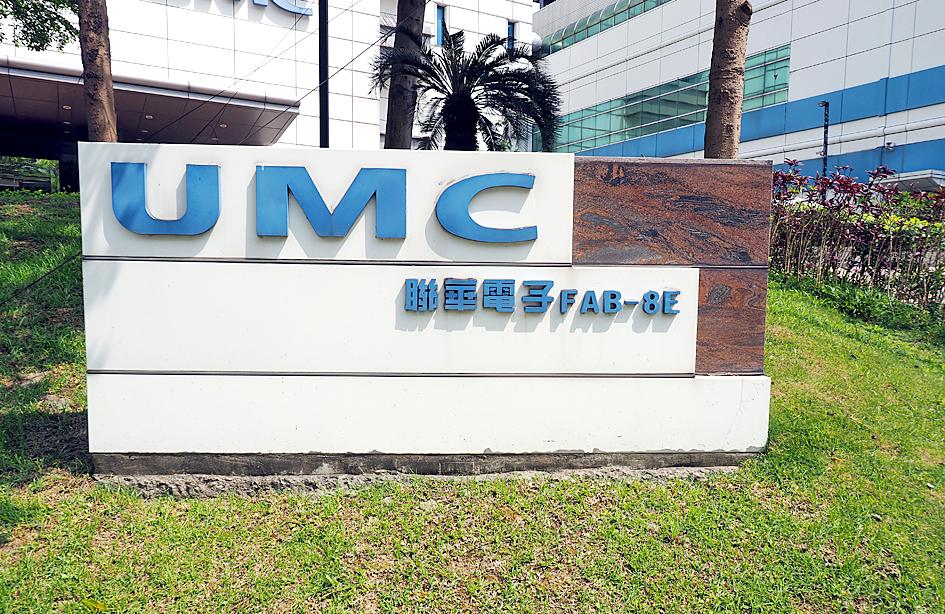United Microelectronics Corp (UMC, 聯電), the nation’s second-biggest foundry service provider, yesterday forecast another thriving period next year, with revenue growth forecast to outpace the 12 percent estimated for its global peers.
To satisfy clients’ strong demand for 28-nanometer chips, the Hsinchu-based chipmaker is to expand capacity by 6 percent next year by squeezing extra capacity from a 12-inch fab in Tainan as its factories are forecast to run at full capacity until the end of this year.
“With the P5 and P6 expansion projects under way at our flagship 12A Fab in Tainan, given the strong demand from our customers, we are well-positioned to grow and capture additional market share in 2022,” UMC copresident Jason Wang (王石) told investors at a teleconference yesterday.

Photo: David Chang, EPA-EFE
UMC is also evaluating the possibility of building a new fab beyond Taiwan, Japan and China, Wang said in response to an analyst’s question about reports that UMC was considering investing more than NT$100 billion (US$3.59 billion) on a new 12-inch fab in Singapore.
“Our capacity will remain full in 2022 both for 12-inch and 8-inch fabs,” Wang said.
Amid a global chip crunch, the chipmaker expects the “average selling price [ASP] momentum to continue into 2022,” he said.
Chip demand is driven by 5G-related applications, electric vehicles and Internet of Things devices, he added.
UMC expects revenue to grow by 1 to 2 percent sequentially this quarter, with ASP estimated to climb by 1 to 2 percent, it said.
Gross margin is to rise to between 37 and 39 percent from 36.8 percent last quarter, the highest level in about two decades, the company said.
Last quarter, net profit surged 91.7 percent to NT$17.46 billion from NT$9.11 billion a year earlier and grew 46.2 percent from NT$11.94 billion in the second quarter. Last quarter’s figure was the best in about 13 years.
Earnings per share rose to NT$1.43, from NT$0.75 a year earlier and NT$0.98 in the prior quarter.
UMC attributed the strong growth to robust chip demand from computing, consumer and communications segments.
The chipmaker said that its capital budget is to remain unchanged at US$2.3 billion this year.

Semiconductor business between Taiwan and the US is a “win-win” model for both sides given the high level of complementarity, the government said yesterday responding to tariff threats from US President Donald Trump. Home to the world’s largest contract chipmaker, Taiwan Semiconductor Manufacturing Co (TSMC, 台積電), Taiwan is a key link in the global technology supply chain for companies such as Apple Inc and Nvidia Corp. Trump said on Monday he plans to impose tariffs on imported chips, pharmaceuticals and steel in an effort to get the producers to make them in the US. “Taiwan and the US semiconductor and other technology industries

SMALL AND EFFICIENT: The Chinese AI app’s initial success has spurred worries in the US that its tech giants’ massive AI spending needs re-evaluation, a market strategist said Chinese artificial intelligence (AI) start-up DeepSeek’s (深度求索) eponymous AI assistant rocketed to the top of Apple Inc’s iPhone download charts, stirring doubts in Silicon Valley about the strength of the US’ technological dominance. The app’s underlying AI model is widely seen as competitive with OpenAI and Meta Platforms Inc’s latest. Its claim that it cost much less to train and develop triggered share moves across Asia’s supply chain. Chinese tech firms linked to DeepSeek, such as Iflytek Co (科大訊飛), surged yesterday, while chipmaking tool makers like Advantest Corp slumped on the potential threat to demand for Nvidia Corp’s AI accelerators. US stock

The US Federal Reserve is expected to announce a pause in rate cuts on Wednesday, as policymakers look to continue tackling inflation under close and vocal scrutiny from US President Donald Trump. The Fed cut its key lending rate by a full percentage point in the final four months of last year and indicated it would move more cautiously going forward amid an uptick in inflation away from its long-term target of 2 percent. “I think they will do nothing, and I think they should do nothing,” Federal Reserve Bank of St Louis former president Jim Bullard said. “I think the

SUBSIDIES: The nominee for commerce secretary indicated the Trump administration wants to put its stamp on the plan, but not unravel it entirely US President Donald Trump’s pick to lead the agency in charge of a US$52 billion semiconductor subsidy program declined to give it unqualified support, raising questions about the disbursement of funds to companies like Intel Corp and Taiwan Semiconductor Manufacturing Co (台積電). “I can’t say that I can honor something I haven’t read,” Howard Lutnick, Trump’s nominee for commerce secretary, said of the binding CHIPS and Science Act awards in a confirmation hearing on Wednesday. “To the extent monies have been disbursed, I would commit to rigorously enforcing documents that have been signed by those companies to make sure we get